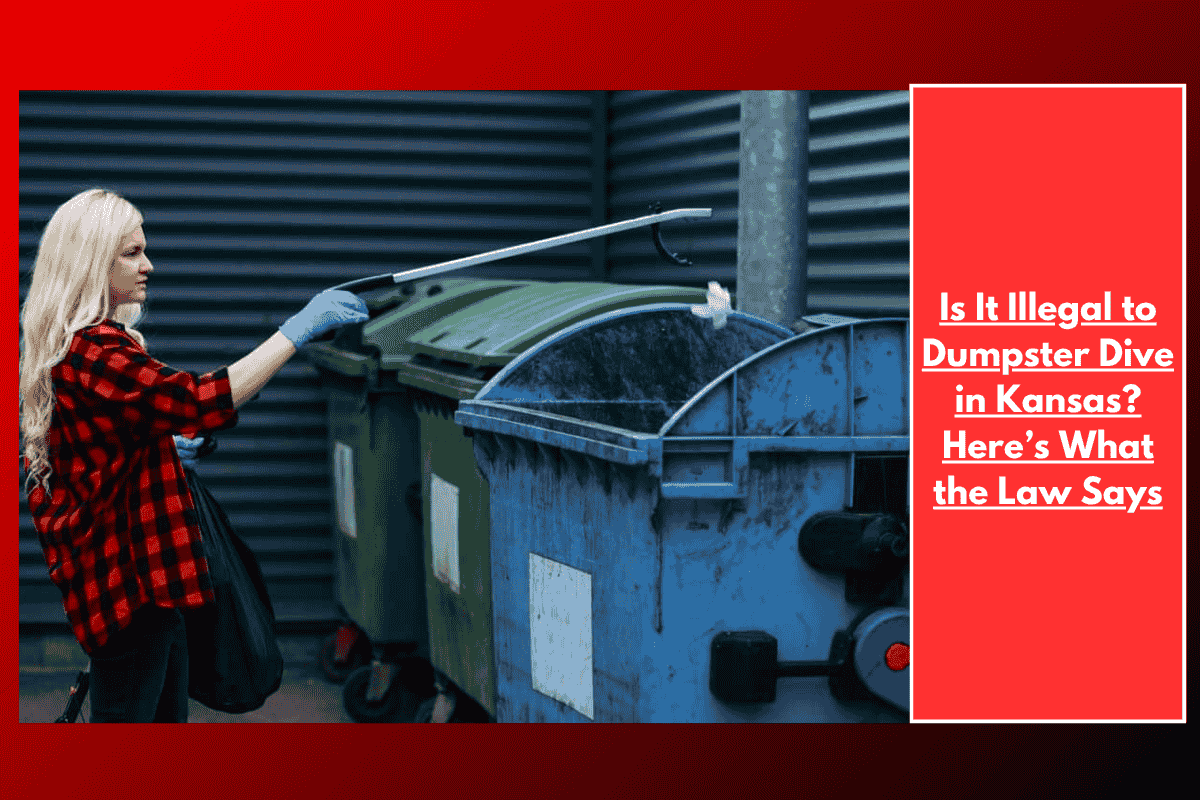Dumpster diving, the act of searching through commercial or residential trash for usable items, has become a popular practice for some looking to find discarded goods or food. However, while it may seem harmless, dumpster diving can raise legal questions. If you’re thinking about dumpster diving in Kansas, it’s essential to understand the legal landscape surrounding it.
Understanding Dumpster Diving in Kansas
In general, dumpster diving itself is not specifically banned by state law in Kansas. However, there are other factors that can make dumpster diving illegal depending on where and how it’s done. Like many states, Kansas’ laws around dumpster diving are shaped by property rights, local ordinances, and trespassing laws. Let’s break down the key aspects that could make dumpster diving in Kansas illegal.
Trespassing Laws
One of the primary legal concerns when dumpster diving is trespassing. If you’re diving in a dumpster that is located on private property without permission, it could be considered trespassing. This applies to businesses, residential areas, and even public spaces that are restricted from public access. In Kansas, like in most states, trespassing laws prohibit individuals from entering private property without authorization from the property owner.
For example, if a dumpster is behind a business or private residence and clearly marked as a restricted area (such as with “No Trespassing” signs), you could be cited for trespassing. Even if the dumpster is not locked, simply being on the private property without permission can lead to legal trouble.
Theft and Property Rights
Another factor to consider is whether the items in the dumpster are legally considered “abandoned” or if they are still the property of the owner. In Kansas, as in most places, once an item is discarded, the property owner typically loses rights to it. However, the act of retrieving items from a dumpster could potentially be seen as theft if the items are still within the bounds of property ownership, or if the owner has not relinquished full ownership.
For example, if the dumpster is clearly marked as being for disposal only and the owner has specific rules about it, taking items could be viewed as theft of property. It’s important to note that businesses or organizations may have contracts with waste management companies, and their property rights may extend to the waste they discard. In such cases, taking items from a dumpster could result in theft charges, especially if the items still belong to the business or are not legally abandoned.
Local Ordinances and Rules
While Kansas doesn’t have statewide laws specifically targeting dumpster diving, individual cities or counties might have their own ordinances. Local governments have the authority to regulate how waste disposal is handled, and some municipalities may have rules against accessing dumpsters. These ordinances often involve concerns like health and safety, waste management, or public nuisances.
For example, certain areas may have regulations that prohibit scavenging through trash due to sanitation or safety concerns, particularly when the dumpster contains potentially hazardous materials. It’s important to check local laws in the area where you intend to dumpster dive to make sure you’re not violating any local rules.
Safety Considerations
Regardless of the legal issues, safety is another critical concern when dumpster diving. Many dumpsters contain broken glass, sharp objects, or hazardous materials. It’s essential to take precautions to avoid injury, like wearing gloves and protective clothing. Additionally, some businesses or residences may discard food, which could carry health risks. If you’re considering dumpster diving for food, be cautious about the potential for foodborne illnesses or contamination.
Dumpster diving in Kansas is not inherently illegal, but it depends on where and how it’s done. Trespassing, theft, and local ordinances can turn what might seem like a harmless activity into a legal issue. If you plan to dumpster dive, always get permission from the property owner, avoid restricted areas, and check for any local regulations that might apply. As with any activity, being informed about the law and taking necessary precautions can help ensure that you’re acting legally and safely.
SOURCES
[1] https://www.answers.com/law/What_are_the_laws_for_dumpster_diving_in_Kansas
[2] https://www.rolloffdumpsterdirect.com/dumpster-diving-illegal/
[3] https://www.herekansascity.com/dumpster-diving-kansas-city/
[4] https://www.reddit.com/r/kansascity/comments/8vvlld/does_dumpster_diving_need_a_permit/
[5] https://www.reddit.com/r/DumpsterDiving/comments/159ul08/in_kansas_is_this_legal/














